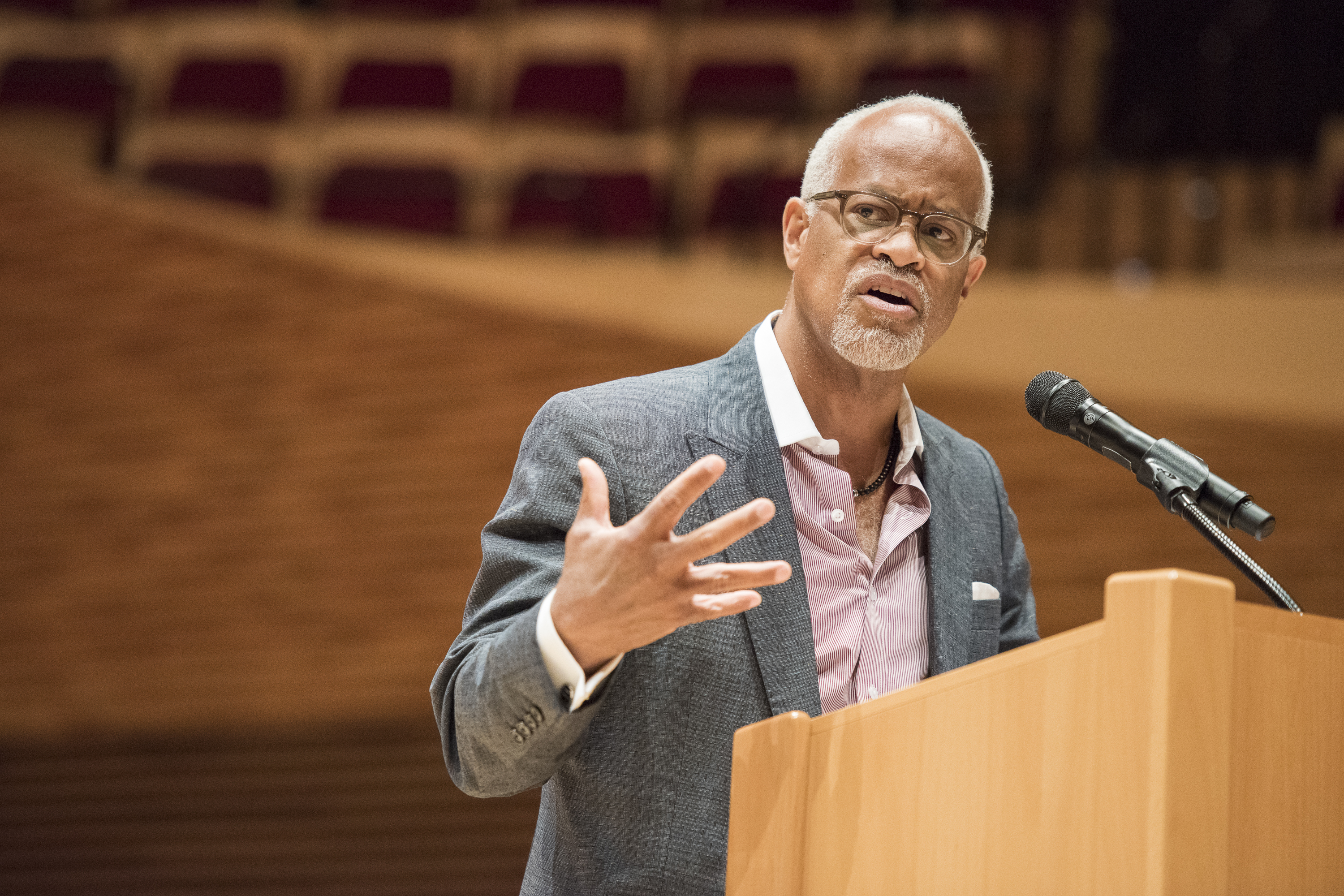Elam stepping down as vice provost for undergraduate education
Harry Elam concludes his tenure as the Freeman-Thornton Vice Provost for Undergraduate Education at the end of the 2019-20 academic year. He will remain in his roles as senior vice provost for education and vice president for the arts.
After a decade serving as Stanford’s vice provost for undergraduate education, Harry Elam will step down from the role at the end of the academic year. He will retain his positions as senior vice provost for education and vice president for the arts.

Harry Elam says that serving as vice provost for undergraduate education for two five-year terms has been a fulfilling experience. (Image credit: L.A. Cicero)
Elam said that serving as vice provost for undergraduate education has been a fulfilling experience, but after two five-year terms, he believes the time has come to relinquish the role.
“I have enjoyed it wholeheartedly and have greatly appreciated this unique opportunity to impact and develop undergraduate education at Stanford,” Elam said. “I think two terms is sufficient, and so I’m happy to let someone else come in and lead.”
Provost Persis Drell, who formally announced Elam’s decision at Thursday’s Faculty Senate meeting, expressed her gratitude for his service and praised his approach to the role.
“Harry has been an inspiring vice provost for undergraduate education,” Drell said. “He has a wonderful ability to connect both to students and to parents. He is a warm and generous person, deeply caring of all constituents of the university.”
In 2010, Elam was appointed Stanford’s third vice provost for undergraduate education. The position encompasses advocacy for – as well as oversight and coordination of – undergraduate general education, including the first-year and breadth requirements. The position also oversees signature undergraduate programs at Stanford, such as the Bing Overseas Studies Program, the Program in Writing and Rhetoric, Academic Advising, the Leland Scholars Program, Introductory Seminars and Undergraduate Research, among others.
Reimagining undergraduate education
As vice provost, Elam has pioneered initiatives that have reshaped undergraduate education into a more holistic experience for students. He oversaw the implementation of Thinking Matters, the current first-year requirement, as well as the creation of the WAYS general education requirements. Recognizing students’ desire to help shape their education, Elam formed the Student Advisory Group (SAG) to advise his office on the direction of undergraduate education at Stanford.
“Students today really feel that need to be engaged within the enterprise of education,” he said. “So working with SAG and with the ASSU leadership have been important parts of this role.”
Another important component of Elam’s work has been making a Stanford education accessible to more students. “One of the major concerns for me always has been diversity and inclusion and how we do a better job of that at Stanford,” Elam said.
On that front, he helped develop and launch the Leland Scholars Program, which eases the transition to college for incoming frosh who may come from low-income backgrounds, have attended under-resourced high schools or be the first in their families to attend college. He also created the SU STEM program to increase the number of under-represented minorities entering PhD programs in STEM fields at Stanford, and developed and directed OpenXchange, a year-long initiative focused on creating diverse spaces in which a variety of open conversations around pressing societal issues could take place.
Elam also created Stanford in New York, an undergraduate program that functions as an opportunity for students’ cultural experience and professional development. To encourage students of any major to participate in the arts, he also designed Arts Intensive, a pre-term, arts-focused program open to any student. Elam also identified the need for and piloted Frosh 101, a program for first-year students that emphasizes community, identity and belonging.
In his faculty outreach work, Elam initiated and developed Faculty College, where faculty across campus could together incubate fresh pedagogical ideas and practices. He has also heightened the value of faculty input around projects connected to the broader undergraduate experience and, to that end, greatly enhanced faculty engagement with the Undergraduate Advisory Committee to the Vice Provost for Undergraduate Education, as well as the Bass Council of Fellows.
Next steps
As senior vice provost for education, Elam will continue to support and oversee the Haas Center for Public Service. He will also help implement the president’s diversity initiative, IDEAL, and assist in rethinking the first-year undergraduate experience. He will also be developing broader integrative educational initiatives.
In his continuing role as vice president for the arts, Elam will continue to guide the university’s efforts to ensure Stanford is a vibrant home for the arts community, a destination for aspiring artists to study and a thought leader in defining the future of the arts.
Elam said that one of the more important efforts he’ll be focused on in the near future is ensuring that the university’s long-range vision includes a continuing commitment to arts practice and expression, which includes a new arts and culture incubator.
Elam’s final day as vice provost for undergraduate education will be Aug. 31, 2020. Until then, he will continue to guide Stanford’s vision for undergraduate education.
“I care deeply about students, and this job is fundamentally about that,” Elam said. “It’s about advocating for students and bringing resources, faculty, staff, as well as alumni and parents together to further our mission in undergraduate education. That personally has been incredibly fulfilling and always exciting.”
